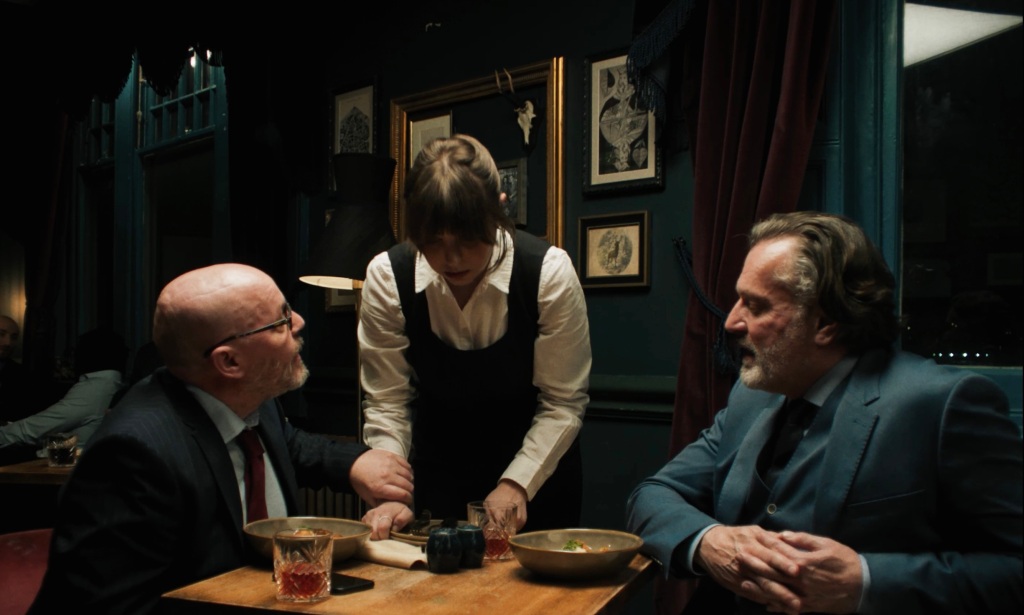Lola On Film reviews fine indie shorts in its Lola Loves Shorts series.
In her hard-hitting short 7 to 10 (2024), writer-director Ana Pio delivers a raw, visceral, unflinching cinematic account of severe trauma in the aftermath of a sexual assault, meticulously constructing the isolated, distorted, fishbowl world of a young woman re-living the violence which occurred five years prior, after a Halloween party, when she was dragged while intoxicated to a small room, and assaulted by two masked men. The script was based on a real-life account.
Mesmerised by the extraordinary performance by Angelika May as Olivia, the protagonist (and story creator), we are immediately inhaled into the vortex of her high distress, an acute survival mode — Olivia’s slouching posture, her stance defensive, her mood brittle, undergoing an episode of profound derealisation, as if a layer of skin has been peeled off, and each sensory experience seems an octave higher than the body’s threshold of tolerance would allow.
The dissociation following the trigger of a repeating event, the celebration of Halloween, brings on flashbacks to the Uni student, which then spill out into her home, her work environment, her hypersexualised intimate relations, all her waking hours as backdrop to a seeming deep unconscious need of resolving and releasing the trauma by re-enacting the trauma. So we witness Olivia entering potentially abusive relationships, choosing men she finds repulsive (an excellent Callum Cronin), her one-night stands, her unsuccessful navigating confined oppressive environments (she works in a Twin Peaks-styled restaurant as waitress), and her cycling back into substance abuse. All the time striving to re-position herself within — as the one now wielding the power.
There is a great deal of narrative emphasis on mask-wearing (duck and ape face costumes), as well as a macabre sexualised re-staging of the event, with very deliberate undertones of ritual.
Our heroine equally valiantly attempts to sooth herself and cope with her condition, with brief interludes of gentle intimacy with a woman, grounding techniques she applies when triggered, and finally, accepting the comfort of her flatmate Zach’s (Luke Elliott) and his boyfriend Olly’s (Joshua Asare) friendship and warmth.
Zach, astute and sensitive, as well as the only one who knows of the assault, tells her that in 7 to 10 years all the cells in her body will regenerate, so “one day they’ll never have touched you”.
May is incredible in conveying Olivia’s sense of desperate shame and vulnerability, as well as irrepressible anger and blame, most often directed at herself — a self-harming fury which reaches a crescendo in the final minutes of the short, with May stomping her bare feet on broken glass, in an attempt to finally be able to feel physical pain instead of the unbearable emotional pressure.
The scene was akin to watching a bursting of a festering abscess, an opening oneself to healing the simmering infection below.
Everything in 7 to 10 serves the purpose of amplifying the protagonists inner turmoil, and facilitate the prolonged mirroring of the event in the outside world — from the boxed aspect ratio (4:3), an aggressively dissonant track (scored by Simon Porter), haunting sounds (Fynnlugh Greenfield-Brown, Haresh Patel) to its dark interiors and saturated colours (photography by Howard Mills) — with very bold yellows and blues, corresponding to the masks and clothes worn by the two assailants.
Connecting the trauma with every aspect of Olivia’s universe in one enveloping, suffocating, revolving closed circuit.
This all evokes a sense of subdued panic in the viewer, as well as unease, without ever pushing us into the same mind space as the protagonist. The presence of elements of black humour in the text, allowed some distance, and the ability to witness the complexity of Olivia’s distress, and the deep wounds that sexual violence inflicts, with the necessary perspective regarding the absurd aspects of life — and the realisation on just how often our wit saves us from sinking.
The only fault in this short I could find was in the density of the experience of it — the story itself so demanding and intricate, requiring perhaps a lengthier timeline to unfold, than a mere fifteen minutes.
Then again, this is why it serves as such a gut-punch.
It’s a difficult watch, yet a brilliantly assembled piece of filmmaking — precise, compassionate, and essential.
Author: © Milana Vujkov
